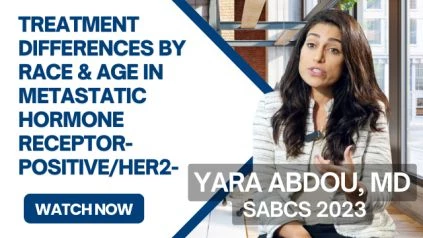Treatment differences by race and age in metastatic hormone receptor-positive/HER2- with Yara Abdour, MD
Transcript (spelling not corrected)
Yara Abdou, MD – Treatment differences by race and age in metastatic hormone receptor-positive/HER2- with Yara Abdour, MD 

Allen Wilbanks: [00:00:00] Okay, we’re here at S. A. B. C. S. 2023 and we’re lucky enough to have Dr Yara Abdu, a medical oncologist at the University of North Carolina Chapel Hill. Thank you so much for sitting down with us. 

Yara Abdou, MD: Absolutely. Thank you for having me. So 

Allen Wilbanks: today we’re gonna be discussing treatment differences by race and age and metastatic hormone receptor positive. 

Her to negative a poster presented here at S. A. B. C. S. 

Yara Abdou, MD: Yeah, so this study looked at treatment differences by race and age in the first line, uh, setting in metastatic hormone positive her to negative breast cancer, where standard of care is usually a C. D. K. 46 inhibitor in combination with endocrine therapy. 

Um, we found on that study that metastatic breast cancer. in the first line setting. Um, [00:01:00] interestingly, we also found that amongst the patients who received endocrine therapy as their first line treatment for hormone positive metastatic breast cancer, younger black women were less likely to receive CDK4 6 inhibitors compared to younger white women, which is, um, surprising because the standard of care is really to provide CDK4 6 inhibitor um, in the first line setting. 

So that brings up two issues here. One is the bias of, uh, providing chemotherapy in the first line setting, the bias of more aggressive disease, uh, in younger women and black women with breast cancer. Although, um, with recent data, like the right choice last year, showing that Cdk4, 6 inhibitor is quite an effective treatment in the first line setting. 

Um, so there’s that bias that, um, our study brought up. And then the second issue is, um, I think access to care, um, and access to the Cdk4, 6 inhibitor, uh, drugs, [00:02:00] which can be very, um, financially expensive. So, um, I think more studies are needed to really delineate this multi level, um, factorial issue of racial disparities in metastatic hormone positive breast cancer. 

Allen Wilbanks: That’s interesting. So, um, this was a poster presented here at S. A. B. C. S. 2023. Um, where’s the data going next? 

Yara Abdou, MD: Yeah, so I’m interested in expanding this data. This was a data on just reflecting institutional, um, uh, patterns of treatment across North Carolina, or actually it’s specifically at UNC. So I’m interested in looking at practice patterns outside of UNC and seeing if we see a similar pattern. 

Um, and if, if this is really an issue, uh, whether it’s access to care or the bias of more aggressive disease, I think we need to tease out that [00:03:00] a little further and provide maybe some education, uh, beyond the study. All 

Allen Wilbanks: right. So that was Dr. Yara Abdu, a medical oncologist at the University of North Carolina, Chapel Hill. 

Thank you so much for sitting down with us. 

Yara Abdou, MD: Absolutely. Thank you guys for having me.

